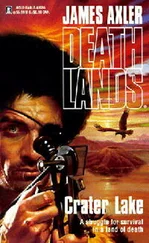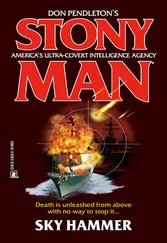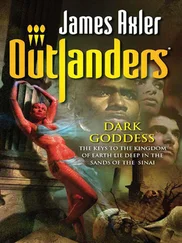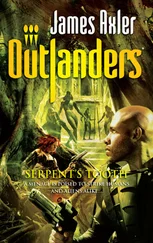“Yeah, but from what?”
Unblinking, Balam looked at it and considered, recalling what he knew of human anatomy. “It looks human in the first instance, but there is something...untoward to its nature. As if it has been...”
Kane glanced up at him. “Changed?” he prompted when Balam left the sentence hanging.
“‘Changed’ is as adequate a word as any,” Balam agreed.
“But how, and by what?” Kane asked, voicing his thoughts.
“The Annunaki are masters of genetic manipulation,” Balam reminded him. “Ullikummis himself is a
horror by their standards, but only because of the
genetic changes wrought upon him at his father’s insistence.”
“Yeah, I remember,” Kane said, nodding. That was not simply old information to Kane; his senses had been assaulted with flashes of Ullikummis’s memories each time he had made a teleportation jump over the past weeks—and so, in some sense, he had experienced much of the nightmarish surgery that had featured in the Annunaki prince’s earliest years. If nothing else, it had given Kane an insight into why the son hated his father with such fury.
“Something’s changed these people,” Balam proposed. “Something altered them—”
“Or tried to. Look at this junk,” he said, riffling through the ash with the muzzle of his blaster. “Someone’s been cooking up a storm, and I’ll bet you it was someone who wanted to destroy the evidence of his failures.”
“The Annunaki do not have failures,” Balam stated wistfully. “They suffer disappointments, nothing more.”
“Well,” Kane said, drawing his Sin Eater out of the sifting sands of ash, “someone’s had a shitload of disappointments in here.
“And we should keep moving,” he added.
With that, Kane stood and led the way through the huge room with Balam trotting along at his heels. Balam looked back a moment, staring at the black smudge of the pit that dominated the room. Death seemed to follow Kane, lying in wait wherever he went.
* * *
IN THE WEST COAST operations room, Lakesh studied the satellite view of the island of Bensalem and consulted several reference documents.
“This island did not exist a year ago,” he stated, shaking his head.
Brewster Philboyd looked at the map that Lakesh had brought up on his own computer screen. “This Ullikummis has pulled things out of thin air before now,” he said miserably.
“No, not thin air, Mr. Philboyd,” Lakesh corrected. “Rock. He has an affinity to rock, it seems, and is able to employ a form of telekinesis to call on such to do his bidding. That was, by our best guess, how he created his Tenth City. The rock itself was pulled up from beneath the soil—bedrock.”
“So, this island—he’s pulled it from the sea?” Philboyd theorized.
“It seems probable.”
Philboyd shrugged. “I guess even monsters need somewhere to live,” he said, nervously pushing the spectacles back up the bridge of his nose.
“No,” Lakesh said, “there’s more to it than that. Look at the design. Almost circular, with the highest towers based in its center. This is the same design that the nine villes followed.”
Brewster moved his face a little closer to the screen, watching the live feed from the satellite as the dark blurs of gulls passed through the overhead image. “That’s been cropping up a lot lately, huh?”
“It is the open secret we never noticed,” Lakesh said cryptically. Seeing Brewster’s quizzical look, Lakesh smiled apologetically and cleared his throat. “This design, the circular pattern of lower buildings rising to a peak in the center—this is the form that every city in the history of humankind has taken. After Brigid’s experience of attempted mind control in Tenth City, she theorized that there was something in the architectural design itself that focused a person’s thoughts in specific ways, perhaps making them more susceptible to instruction. As such, it is a way of controlling people, a sigil that traverses time. This is the same design of the cities that you and I inhabited in the twentieth century. We may presume that the subtle control of humanity by the Annunaki is long-lived, Mr. Philboyd.”
While it seemed fanciful, the use of sigils—or magical symbols—that Lakesh referred to was prevalent throughout human history. Most infamous among these was the Nazi swastika, a reversed symbol for peace that, in its mirrored form, was believed to have wrought conflict.
Lakesh and Brewster stared at the image on the latter’s terminal screen in silence while, across the room, Donald Bry became more animated in his conversation with Grant about the mysteriously appearing parallax point. At the same time, one of the Tigers of Heaven, the modern-day samurai warriors whose property the Cerberus base had temporarily commandeered, took two paces into the room before subtly attracting Lakesh’s attention.
“Dr. Singh,” the squat, broad-shouldered warrior urged, “your presence is required outside by Mistress Shizuka.”
Lakesh nodded. “Keep an eye on the situation here,” he told Brewster Philboyd, glancing across to Donald Bry as he did so. “If anything changes, I want to know.”
“Sir,” Brewster acknowledged with a curt nod.
* * *
THOUGH FULL OF OMINOUS shadows, the fortress of Ullikummis appeared to be empty, and after a while Kane stated that conclusion out loud. “If we haven’t bumped into anyone by now, my guess is we ain’t gonna.”
The fortress had several levels, connected by rough, uneven staircases or spiraling ramps. While its passageways were wide, the rooms felt haphazard and cramped, like things that had budded from the main walkways rather than been intentionally connected. That was disquieting to Kane, who felt there was something almost living about the structure itself despite its lack of movement. It felt grown, formed organically. In some way, walking through the fortress felt a little like walking through a body.
They found rooms that contained possessions, obviously human. One room had a bunch of letters on the hard stone cot that stretched against one wall, tied with a ribbon and inexpertly hidden in the folds of a fur blanket. Another room, this one featuring two stone bunks, had a simple game board carved of wood, a jointed hinge along its center so that the pieces could be cleverly stored within. None of the rooms had doors, and Kane recalled how the cells had worked in Life Camp Zero, the prison that Ullikummis had used to hold the Cerberus exiles. Those cells had seemed to be hollows in the rock like honeycombs, and their doors only appeared when necessary, a shifting of a rock wall that seemed almost to have the properties of a liquid and a solid in one item.
Balam stopped as they walked past another open doorway, turning and walking to the room as if in a trance. Kane continued on, peering in each open doorway in turn, glancing across the shadow-dappled interiors before moving to the next. Three rooms along, he saw something odd resting on the floor. Clearly broken, it looked like a bucket seat or a gigantic vase, the top torn free to leave a jagged line. As Kane stepped closer, something fluttered across his vision and he found his sight turning dark. Kane looked around, realizing for the first time that Balam was no longer with him. He hadn’t noticed his silent companion had stopped some doors away from him, and it only dawned on him now when his vision started to fade, the colors ebbing away to be replaced by grayness, the subtle edges of the stone walls and the shattered bowllike object diminished to a blur.
“Balam?” Kane called, turning.
The two were linked, and it was in this way that Kane could see, using their telepathic tie to overcome his own blindness. Proximity affected the bond, lessening its effectiveness as Kane well knew from a similar event while they had been searching the old Cerberus redoubt. So many new limitations to remember and to juggle, Kane cursed as he stepped out of the room. So many hazards to navigate at each turn.
Читать дальше












